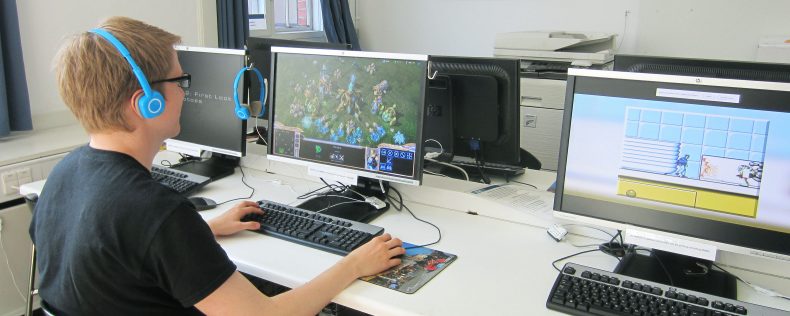At the Games & Society Lab at Uppsala University, Joshua Juvrud takes an individualistic approach using psychological methods to better understand how different game players (with different personalities, traits, and experiences) interact with various game mechanics, and are in turn affected by game experiences. Research questions and findings are therefore highly relevant for both developers of games and digital media, as well as psychologists, sociologists, and health scientists.
As a research assistant, you have the opportunity to work with digital and physical games (e.g., video games, board games, LARPING) in an experimental context using research tools such as eye-tracking and psychophysiological measures to answer questions related to human behavior. Participate in research seminars, conduct experiments with games, and work alongside leading researchers.
Research Location & Collaboration
Research will be conducted at DIS Stockholm and the Department of Game Design, Uppsala University, at the Campus Gotland in Visby.
During summer 2024, research assistants will spend 10 days in the medieval city of Visby on the Swedish island of Gotland. We will work with several researchers and graduate students at the Department of Game Design, Uppsala University, Campus Gotland, on a project studying the psychology of play behavior.
Using galvanic skin response (GSR) and facial emotion analyses technology, the study aims to explore play behavior in a custom-developed deception game (similar to Mafia and One Night Werewolf). We will examine emotional arousal, emotion synchrony and empathy, deception, and decision-making behavior. Data collection for the project will be carried out in the remaining four weeks in Stockholm with the research supervisor.
While in Visby, students will have the opportunity to participate in the Gotland Game Conference, a three-day event where students and industry members present new and developing projects in games and media.
Research Assistantship Hours
You will spend 180 hours directly engaged in research, together with 20 hours in co-curricular activities, during your Research Assistantship. The research will take place at Uppsala University, ranked one of the top universities in the world, in the city of Uppsala. Please note that approximately 8 hours per week will consist of commuting between Stockholm and Uppsala by train (2 hours back-and-forth total per day). Hours may also not be distributed evenly across weeks – there may be peak times in the research process where all Research Assistants are expected to spend a few more hours – and then possibly a few less – another week, to reflect the individual research project and process.
Field Studies: Culture & Language
As a co-curricular complement to your summer research, you will meet every Wednesday, together with faculty from the DIS European Humanities program, for a 6-week introduction to culture and language in Stockholm.
Select Mentor Publications
- Juvrud, J., Gredebäck, G., Åhs, F., Lerin, N., Nyström, P., Kastrati, G., & Rosén, J. (2018). The Immersive Virtual Reality Lab: Possibilities for Remote Experimental Manipulations of Autonomic Activity on a Large Scale. Frontiers in Neuroscience, 12, 305. https://doi.org/10.3389/fnins.2018.00305
- Juvrud, J. et al. (2022). Game or watch: The effect of interactivity on arousal and engagement in video game media. IEEE Transactions on Games, 14(2), 308–317.
Related Discipline(s)
This summer course would also be of interest to the following discipline(s):Child Development, Sociology

